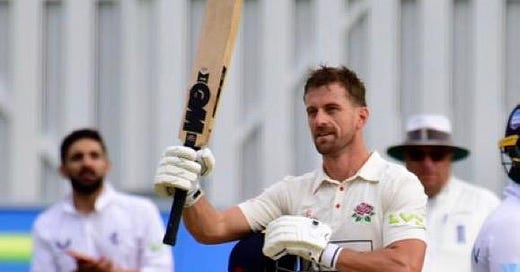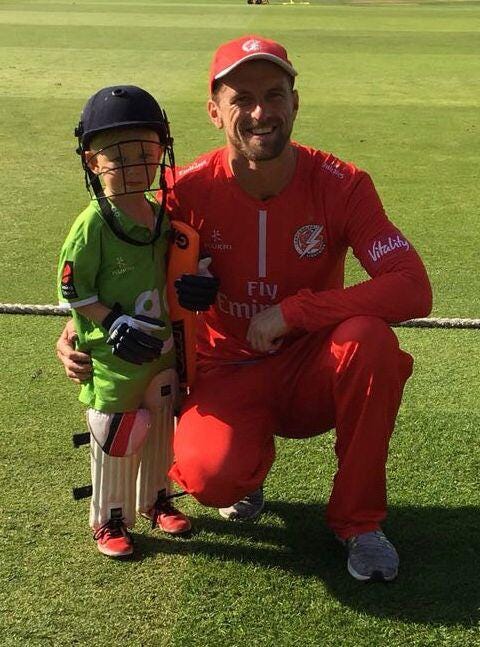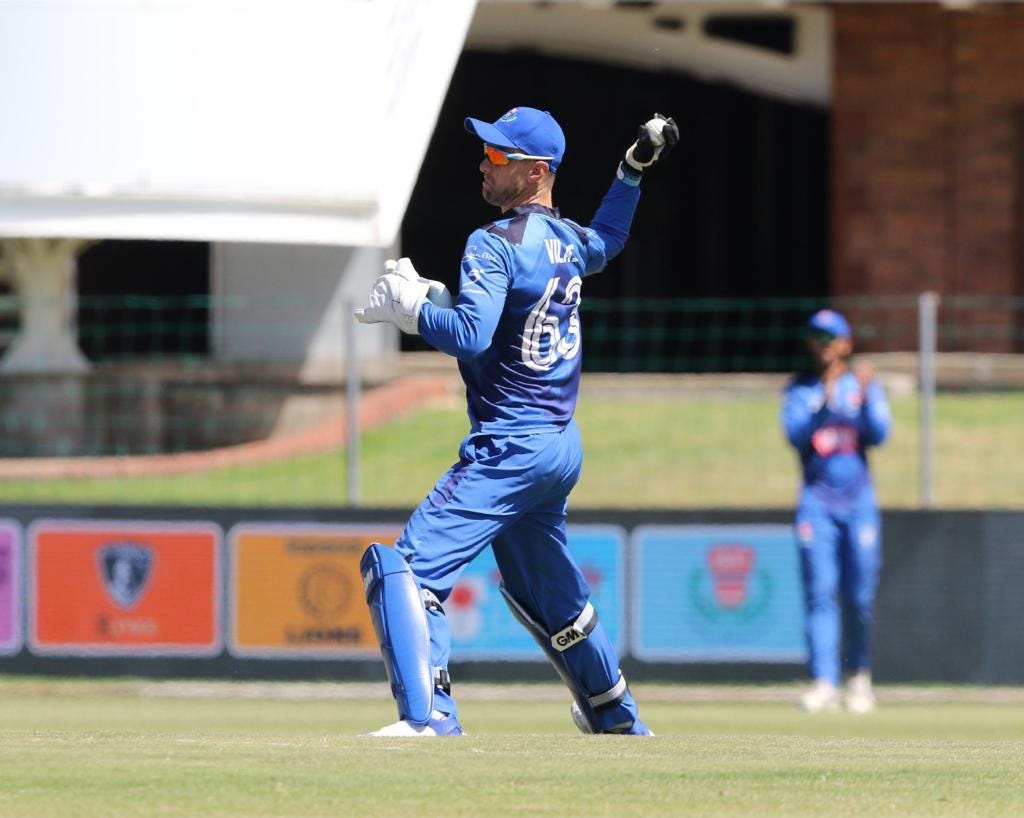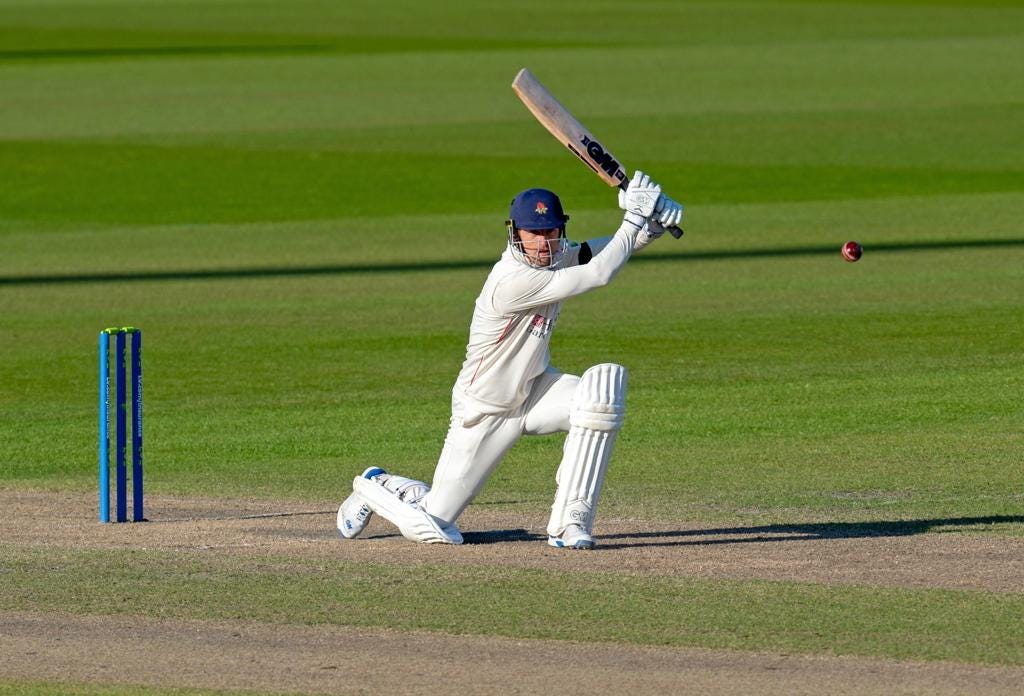From the fringes to captaincy: Dane Vilas
If you missed the previous article, it is on Tristan Stubbs:
If you are not a subscriber of Stumped!, join more than a thousand other professional athletes & ex-pros, coaches, commentators & analysts and casual sports fans that receive the newsletter in their inbox each week — it’s free:
Dane did not start well at Lancashire. He scored some runs in his first game and then had a poor run afterwards. After a few matches, Dane suffered a breakdown of sorts. He started questioning whether he belonged in County Cricket and developed doubts about whether he had made the right decision by leaving South Africa.
He had uprooted his family and brought them overseas, only to have a disastrous debut season. It was hard to take in.
His County Cricket dream was turning into a nightmare. Dane has always cradled a dream of playing County Cricket. All his childhood heroes played County Cricket. Jimmy Cook and Justin Kemp played for Somerset, Neil McKenzie played for Hampshire, and Ashwell Prince was a Lancashire legend.
“When I was at the Cobras, Ashwell Prince was the coach,” Dane recalls. “Sometimes I would ask him about Lancs, he had only great things to say.”
Lancashire was a big club, a big club that he wanted to be a part of. When they came calling, he didn’t hesitate. He knew his international career was over anyway. He was a replacement player, and Quinton De Kock had come back into the team. It made sense to move on.
The bad run of form was making him doubt the decision. He was having a crisis of confidence.
“It's important to have good people around you, people that can help you through stuff like that,” says Dane.
His wife is that person for Dane. They have been together forever, and not many people know him as well as she does. She helped him through that phase. He also had his father. His dad has always been a rock for him.
Dane fulfilled a couple of cliches that season. One that says form is temporary and class is permanent. The second one is that every batter going through a difficult period is one knock away from a big one.
A few games later, Dane scored his first century for Lancashire in a match against Somerset.
“It was an amazing moment for me,” he says.
Five years after joining Lancashire, Dane has scored five centuries and three double centuries for them.
April 2022:
Dane Vilas raised his bat to salute his teammates. He had brought up his 23rd First-Class century with a four off Hamidullah Qadri’s bowling. He had spent about four and half hours at the crease on his way to the ton.
Summer 1999:
Dane Vilas had been batting for more than about two hours. He had faced around 90 balls. Dane was on 99 and needed only one run to reach his first century. A nudge or a nick just wide of a fielder was all he needed, and he would celebrate his maiden century. Just one more run, and he would break the drought.
Just one more run…
The KES Under-14s were playing against Parktown. The two teams had a healthy rivalry. Victory over Parktown was always sweet. Achieving a milestone against Parktown was even sweeter. The tension in the KES dugout was palpable. Everyone wanted it to happen for him.
But it didn’t happen.
Dane was dismissed on 99. Nerves got the better of him. That wouldn’t have mattered if he had listened to what Ryan Cook and a couple of other guys had in mind he still would have had his century.
As his teammates, parents and opposition clapped Dane off the field, Ryan Cook - was the scorer that day - and a friend conspired to add one run to Dane’s lot. He had played so well and had waited so long for his maiden century that they felt he deserved it even if he had been dismissed one run short.
“We tried to scratch out the 99, but we couldn't get it past him,” laughs Ryan.
Ryan tried to tell him that they might have made a mistake with the scorebook and he might have got a 100. But Dane was adamant. He wasn't having any of that. He asked them to change it back to 99.
“They wanted to add 1 run to give me the hundred,” says Dane. “But it wouldn’t have been the same as getting it for real and would have felt cheated of that special moment.”
Dane Vilas had to wait six more years for his first ton. It was for Old Edwardians. But, once he had that one under the belt, the floodgates opened. He has gone on to score 22 First Class centuries. Five of them are double centuries.
Ryan Cook, a longtime friend and batting coach to Dane Vilas, still finds it incredible that Vilas took so long to score his first ton. Ryan and Dane have been friends since they were 12, 13 year-olds. Those days Dane fancied himself a pretty decent allrounder, a batting allrounder who could swing the ball both ways.
“I thought I could swing it both ways, but I probably didn't,” Dane says. “But, I really thought I was a good swing bowler.”
He was probably the only one who thought that, as most teenagers are wont to do when they evaluate their skills.
Anyway, patience is one of Dane’s enduring qualities. The same way he was happy to wait for his first century is how he waited for his opportunity at premier league cricket. Dane spent two years sitting on the wooden bench facing the nets at the Gauteng Strikers’ training grounds.
Every day for twenty-four months, Dane showed up on time for training and just sat there watching guys like Warren Dugmore, Doug Gain, Warren Swan and many others who were doing well for the Strikers. It’s not that he enjoyed watching them, but Dane watched them as he waited for his turn to have a net session.
He worked for Opal Sports as a rep selling golf equipment at the time. He also acted as a part-time bat repairer for professional cricketers in the GM stable. It was only after work that he went to sit in the nets after work.
His parents were very lenient with his hours. As long as he got the work done, they didn’t mind him knocking off a little early to go for net sessions. His parents did not know that his opportunity always came at the backend. That time when daylight was waning and almost everyone else was done. But Dane did not mind that at all. Lawrence Mahatlane kept him company.
A strong relationship resulted from those late afternoon/early evening sessions. It was a player-coach relationship that helped Dane to take his game to the next level.
Dane’s first toy might as well have been a cricket bat. He grew up around them. By the time he was born, Opal Sports had grown into more than just a tiny karate suit factory. That is the company his grandfather and mother bought in 1978, a small karate suit factory called Opal Canvas and Webbing.
By 1985, Opal Canvas and Webbing had become Opal Sports and was the official Gunn and Moore equipment distributor in South Africa. Peter Kirsten was the first high-profile star on their books, and he opened the door to many other South African legends, including Dane’s personal heroes as a youngster, Jonty Rhodes and Neil McKenzie.
“I think they just looked after me tremendously,” says McKenzie. He has been with the Opal Sports family for 17 years now. McKenzie uses GM bats and Ping golf equipment. “There's loyalty going both ways. They are a great Old Edwardian family.”
Dane didn’t see his heroes from a distance, he saw some of them up close.
Anyway, Dane had lots of bats growing up, but none of them meant as much to him as the GM Maestro.
“That’s the one bat I loved the most,” says Dane. “I still cherish and I wish they would bring the Maestro back. It was a work of art.”
Interestingly, Dane’s first Maestro was a broken second hand one, pre-owned by Herschelle Gibbs.
When Herschelle Gibbs brought it into the Opal Sports shop, the bat was broken at the toe end. It was a standard Herschelle Gibbs thing. It is something that everyone expected from Herschelle Gibbs. Dane Vilas never understood it because Gibbs is one of the most graceful batters he has ever seen, and yet his bats always broke on the inside edge, right at the toe. That is the one area where they would always split.
Whenever Gibbs brought one in for repairs, that was the area that needed attention. This one was no different, just a little worse than the others.
“I told him, ‘Look, I'm going to repair it, but it's not going to come out as nice as you want it. So maybe you should just get a new one,’” Dane recalls.
He was doing holiday work at the Opal Sports factory. This is where the Vilas boys spent most of their holidays, in the factory and warehouse, making sets or packing whatever needed packaging.
“We spent a lot of time helping the staff with the packing,” says Dane. “Some of those ladies working there have been with us for ages. They are almost like my aunties, my second moms. I remember being part of them and helping them pack and probably just getting in the way really.”
Herschelle Gibbs walked in with the Maestro in 2001. Dane was 16. He idolised Herschelle Gibbs.
“He was a legend for us and Gunn and Moore,” says Dane Vilas.
Anyway, Herschelle took a new bat, and Dane took the old one. He was in love with it. One of the first bats that his mother acquired for him was a GM Autograph. Dane loved that bat, a lot. But not as much as this secondhand GM Maestro bat. It had a mesmerising ‘beautiful’ blue control sticker on the back. Dane invested a lot of hours into its repair. He was generous with his wood glue application, put in a dial and wrapped it with a lot of tape.
“It wasn’t as good as new, but it was good enough to play with and score lots of runs,” says Dane. “It was just an amazing bat.”
Speaking of that bat makes him smile. Dane still tries to copy the shape of that old Maestro as much as possible when he is working on new bats. The bat that he scored his 23rd First-Class ton with has certain parts that mimic the Maestro. Dane made those modifications.
This Substack column exists thanks to patrons and readers that leave tips. Stumped! is wholly supported by Readers Like You. To keep the weekly posts coming and keep the lights on here, consider leaving a tip or supporting monthly on Patreon. You won’t regret it!
Don’t forget to share the post with friends.
Dane never expected much from his cricket. He did not think he could carve a career from it. During his high school years, Dane had never made any of the representative teams. He knew well enough that while it was not impossible, it was difficult to break into professional cricket if one did not play representative cricket. Many just get lost in the system.
At school, he was friends and played with guys like Roger Da Camara, Vaughn van Jaarsveld and Blake Snijman. Unlike him, they represented Gauteng in age-group cricket and played Coke Week and Under-19 cricket. Their path was much more straightforward. From Under-19 cricket, they were taken into the Gauteng Academy, and the next step was Lions.
Dane always expected that he would end up working at Opal Sports at some point. So, when he went to the UK to play club cricket for Notts Unity Casuals, he also did a six-month apprenticeship at the Gunn and Moore factory in Nottingham.
Regardless of that, Dane gave cricket a good go. He approached the sport with the same commitment that he approached rugby at KES. When he arrived at the school, rugby was a highly regarded sport, so he decided that he wanted to make the teams.
“After lots of trials, early mornings, Dane made the last 60. He was excited and thought that at the worst he would be in the D team,” says Anne.
It is easy to imagine his disappointment when he perused the school notice board on Monday morning to find that he had not made the first four teams, A to D. He had been named as a reserve for the H team. Dane did not lose heart and worked his way up to the B team. That was his rugby story at KES. He eventually made the first team in his matric year, but time after time, he had to work his way from the bottom of the pile, the Hs, the Es or the 8ths.
“I love playing cricket, and as a young man, I just did as well as I could. I wanted to see how far I could take it, just how far I could go with it,” says Dane.
His career could have ended in the same manner as Rob Prout’s, Dane would not have minded. He would have enjoyed club and indoor cricket the same way he enjoyed his time at Lancashire.
Prout is Dane’s uncle, he was one of the bright talents of his generation. Prout was a proper middle-order batter and excellent wicketkeeper in his youth. He played for SA Schools in the 80s. He had hopes of making the step up to provincial cricket, his only problem was Ray Jennings. There was no way an untested young man would unseat a player like Ray Jennings in the Mean Machine lineup of the 80s.
That is the nature of cricket, wicketkeepers have very limited opportunities. Unseating the incumbent is extremely difficult. Consider the case of Wendell Bossenger.
Bossenger faded away as a player when Cricket South Africa restructured the domestic league. The best wicketkeeper in South Africa at the time was left high and dry. Griquas was no longer in the top tier, and Bossenger was left to play amateur cricket. The other teams could not absorb him because they had good incumbent keepers.
It’s such a specific role, and when you are good at it, people struggle to see beyond it. It’s a struggle that Dane is familiar with.
Dane was a teen, then a young man and finally a professional cricketer during the Mark Boucher years, he knows what it is like. After Boucher, the Proteas chose to go with Quinton De Kock, they were looking to the future. Similar to the Boucher years, Dane knew that he and other wicketkeepers were jostling for the SA A spot.
Dane was seen as a wicketkeeper first. He was a good one. Dane started keeping at 14, mainly because he wanted to be involved in all things to do with the game. At one point, he tried bowling, but that did not really work out. He was a decent medium-pacer and could move the ball a bit. But he knew that he was never going to be a great swing bowler.
Then the Jonty Rhodes era came. Jonty inspired visions of taking incredible catches in almost every young cricketer. Dane was not spared. Wicketkeeping was a good option.
During his time with the Strikers and Lions, he had the mentorship of Grant Morgan. Morgs helped him polish his keeping skills and go beyond just being a competent keeper to a great keeper. They had a religious regimen of training during their time together in 2009. Morgs remembers Dane as a relentless young man, while Dane remembers Morgs as a giving coach.
“He gives you so much energy and will work as hard as you if not harder,” Dane says of Morgs. “He will try to push you to be better, to be the best you can be. And, he really gives you all the attention that you need, and keepers need a lot of attention.”
Wendell Bossenger also had serious input. Bossenger was Dane’s coach at SA A. Bossenger gave all his knowledge to Dane.
“Wendell was very technical,” says Dane. “I think I needed that at that stage of my career. He taught me really good catching. Like Grant Morgan, he was very passionate about keeping.”
Dane was so good at wicketkeeping that Proteas selectors struggled to see beyond that. Grant Morgan feels they should also have taken notice of Dane’s batting.
“Things have changed in the past six years or so,” says Grant Morgan. “These days if a keeper is good enough as a batter, they are selected as a batter. That did not happen with Dane, he was always picked as a keeper, a replacement keeper. People forgot that he could bat as well.”
Dane would have loved to play for South Africa a little more, who wouldn’t. But, he was also grateful that he had a few matches for the Proteas. Like any other batter, he feels he left many runs out there, but he is still grateful that he played those few Tests. Many talented and able players never get the opportunity.
“Growing up I never expected to be a professional player, so I did not really expect to play for South Africa,” says Dane. “To get those opportunities is something that I will always cherish. I only wish that I could have done better with the bat.”
Dane was leaving. Everyone knew that he was leaving. Dr Moosajee knew that Dane was leaving, but when the Proteas needed someone to cover for Quinton De Kock - who had injured himself hours before South Africa’s first Test against England at the Wanderers - the then Proteas team manager picked up the phone and called Dane. He was the best wicketkeeper around, and you pick your best.
That’s why Lancashire did not hesitate to sign him as their first overseas player when Brexit affected players signed under Kolpak contracts. That and his leadership qualities. When Grant Morgan was rebuilding the Dolphins in 2016, one of the people he brought in to help him was Dane Vilas.
“I wanted a senior player who knew success and a leader I could trust,” says Morgs.
Dane has the tactical nous. He learned a lot about the game from Neil McKenzie and Justin Kemp, some of the most astute cricketing brains around. He also picked up stuff from Graeme Smith, Faf du Plessis (a fine leader and good man), Hashim Amla and a few others. Besides knowing how to manage the game, Dane also has excellent man-management skills.
On this front, Dane picked a lot from his parents, how they managed Opal Sports. He stresses the importance of having empathy and emotional intelligence. Being the overlooked kid at both age-group cricket and rugby, being a fringe player, then a replacement player, and all the other struggles he faced and the good things that happened helped Dane relate to players from various backgrounds.
“I think I never ask someone to do something that I wouldn't be prepared to do or what I would think is unrealistic,” says Dane. “My duty as a leader is to help the players along. For that to happen, I need to understand them as individuals, where they are coming from.”
He is also a fan of teachable moments. Sarel Erwee has one.
Sarel and Dane shared a house when both were at the Dolphins in 2017. They both played for Dolphins at the time. Every day at sundown, the two housemates would walk to the nearest Woolworth’s shop for supplies. On the way there, Dane would suggest a detour.
They would go into the local pub for a few pints. Dane being a people person, would have conversations with the locals. After a pint or two, they would proceed with their journey. On the way back they would make another stop at the pub again. Naturally, Dane would be carousing with the locals.
“Without failure, the next morning, Dane would wake me up very early, already in his jogging gear,” Erwee recalls. “The lesson he taught me was that no matter what you do the previous day, let the main thing remain the main thing.”
Anyway, back to Dane’s last hurrah.
Dane was in P.E, Gqeberha, at the time. The Cape Cobras were due to play against the Warriors on the same day as the Proteas taking on England. Dr Moosajee’s call came in at 6 am, and Dane was airborne at 8 am.
“I sat for about two hours on the aeroplane, and all that time I wanted to tell the pilot to hurry up if he could because I actually got a test match I need to go to,” says Dane. “But, of course, I couldn’t, so I was just sitting there, waiting.”
When he landed, he rushed to the Gautrain. When he got off the train at Sandton, he found a police escort waiting for him. A police escort from the Gautrain station to his home ground for most of his life, the Wanderers stadium, dressed like a rockstar, a t-shirt and jeans with a day-old beard to finish off the look, who would have imagined?
Even Hollywood would not have come up with a better script. Police sirens blaring to alert other motorists of an important traveller in the vehicle trailing them, the Proteas won the toss and chose to bat first. Bowling first might have been better, but their wicketkeeper was still in transit.
“Before I knew it, I was out there batting, facing Jimmy Anderson, Broady and Ben Stokes and, you know, getting a rollicking and Balmy Army was singing, and I was like, ‘Jesus, I shouldn't be here!’” Dane narrates. “It was an amazing experience.”
If you had told Dane, when he played for Old Edwardians, that this is how he would be travelling to his last match for the Proteas, he would have laughed at your face.
Not many cricketers get that sort of send-off. Many just slip away, unnoticed, no send-off, accidental or not. Regardless of how it came about, Dane Vilas was proud to have such a cool closing to his international career. He went out like a rockstar. Dane went out on a high.
A few months later, he was padding up for Lancashire.
Thank you for reading. I am entirely freelance and have no intention of putting content behind a paywall. However, for me to be able to continue producing more content, I depend on your patronage. So, please do support my work on Patreon.
Alternatively, you could Buy Me A Coffee.
Also, please encourage anyone whom you think may be interested in my work to subscribe.









